Showing 73–84 of 136 results

Professor Davane offers stimulating perspectives on varied themes covering classical Sanskrit literature, poetics, linguistics, history, mythology and legendary narratives including reinterpretations of the Vedic view of the moon, samudra, dreams, etc.
A distinguished scholar who has had a lifetime engagement with Sanskrit studies: ranging from the Vedic samhitas to contemporary literary criticism, Professor Davane here offers at once insightful, highly stimulating perspectives on diversely varied themes from classical Sanskrit literature, poetics, linguistics, dramaturgy, history, mythology and legendary narratives. And, these apart, brilliant reinterpretations of the Vedic views of the moon, samudra (ocean), dreams and deep sleep. Reviewing the gamut of kavya definitions and its scope, in terms of the literary genres it encompasses, the book critically examines, for the first time, Rajashekharas view of shabdaharana (verbal borrowings), kavisamayas (conventional poetic ideas) in Sahityashastra, and the progression of rasanishpatti in classical Sanskrit literature. It also seeks to gauge Mahamahopadhyaya Dr. P.V. Kanes contribution to Sanskrit poetics rather than his oft-appraised work on Dharmashastra. Dr. Davane marshals an astonishing mass of original literary sources to highlight the all-expansive influence of Kalidasas unparalleled Iyric: Meghaduta, on classical writings, the richness of Banabhattas utprekshas (poetic imagination), the emergence of Sarasvati as a pantheonic deity, and how Sita, the epitome of ideal womanhood, has been varyingly portrayed by over twenty Sanskrit playwrights. Also shown, in addition, are the legends/myths about Samudra-manthana, Amritamanthan, Rahu-Ketu, Udayana, and Dhanvantari, in their altogether fresh perspectives. This composition of Prof. Davanes writings is an essential reading for the scholars/researchers of Vedic and Classical Sanskrit literature.
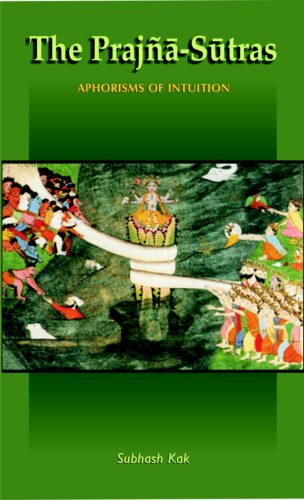
The book presents a bridge between the cosmologies of Vedic knowledge and modern science. Commentaries are provided in 18 sutras on the nature of reality, language, art, mind, transformation and freedom. The sutras deal with abstract ideas, including aesthetics, love, war and suffering.
The Prajna Sutra presents a bridge between the cosmologies of Vedic knowledge and modern science. The ideas are presented as 18 sutras on the nature of reality, language, art, mind, transformation, and freedom on which explanatory commentaries are provided. The sutras tie together common symbols of the Vedic tradition and their deeper intuitions using contemporary vocabulary. The synthesis presented in the sutras is wide-ranging and it not only deals with abstract ideas but also with questions of meaning, aesthetics, love, war, and suffering. Although some consider only linguistic problems to be worthy of study, linguistic expressions ultimately are about things and they cannot properly address the mystery of consciousness. The sutras consider issues that go to the core of philosophy, namely the nature of reality and the relationship of the experiencing subject to it. They speak of the complementary domains of rationality and paradox that underlie ordinary experience. They explain how the mystery of consciousness relates not only to the individual’s cognitive capacity to know but also his ability to transform both himself and his environment.
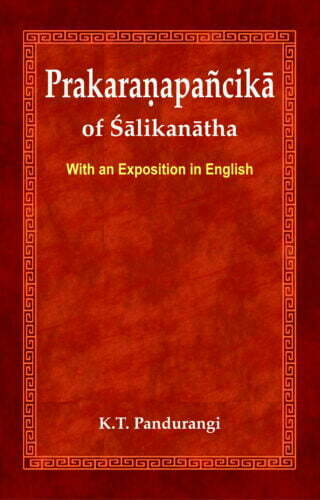
The book of Purva-Mimamsa presents a detailed account of the Prabhakara system and explains the eight main issues in which the other systems of Indian philosophy do not agree with the Prabhakaras. Prabhakara thoughts are here undertaken in the light of modern developments in the areas of epistemology and linguistics.
Prakaranapancika of Salikanatha is an important text of Prabhakara Mimamsa. Salikanatha who is a direct disciple of Prabhakara made distinct contribution to Indian Epistemology and linguistics. The concepts of Svaprkashatva of cognition, Triputikarana formula, Akhyati theory of perceptual error are some of his important contributions in the area of epistemology, whereas anvitabhidhanavada, a theory of sentence meaning, the concept of Karya i.e., Niyoga as the import of injunction, the inclusion of Pauruseya statements under the inference are considered as his important contributions in the field of linguistics.
Nyaya and Bhafta Mimamsa strongly criticize all these concepts, but Vishistadvaita and Dvaita schools are a little friendly in some respects. We are sure that a study of Prakbhakara thought in the light of modern developments in the area of epistemology and linguistics will be fruitful.
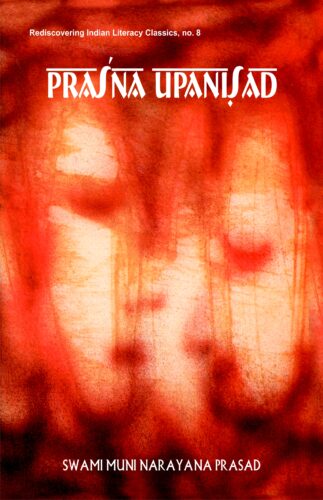
This commentary unravels the riddle-like statements and contexts of the Prasna Upanisad in the light of the meta-logic of Yogic buddhi to study deeply the Brahmavidya philosophy and thus the problem of origin of beings.
In Upanishads is articulated not only the quintessence of spiritual wisdom, but also the remarkable philosophical genius of the classical Hindu mind. Owing, however, to their complexity, metaphor, and even obscurity, Upanishadic writings have been endlessly debated, discussed and written upon, more specially since Shankaras time. Swami Narayana Prasads commentary is yet another valuable addition to the existing literature attempting, as it does, to rationally unlock the metaphysical subtleties of Prashna Upanishad with the master-key handed down to him in the disciplic succession of Sri Narayana Guru. Prashna Upanishad offers an enlightened exposition of brahmavidya: knowledge of the Absolute/Supreme Reality. In an aptly thought-out dialectical situation, it offers a threadbare discussion of six questions which, centreing around procreation/origin of beings, prana: the most vital life-sustaining principle, functional states of the Self (purusha), significance of meditating on AUM lead to the finality of Vedantic wisdom: the sublimity of non-dual Reality: the param purusha of sixteen kalas.

Prof. K.K. Handiqui’s English translation of Setubandha, with detailed introduction and notes, is a monumental work in Prakrit Mahakavyas. It is an onerous task with amazing accuracy and analytical acumen. This critical translation recovers and clarifies the original meanings, Pravarasena’s intentions and implications of poetic expression in Setubandha.
Literary traditions of Sanskrit and Prakrit were highly synchronized for the last two millennia, giving a fillip to arts, cultures and literary creativity. Pravarasena’s Setubandha (or Ravanavaho), a fifth-century composition and the first Mahakavya in Prakrit, is an excellent example of this synchronization, and it has exercised unmistakable influence on Bharavi and Magha.
This volume, Prof. K.K. Handiqui’s English translation of Setubandha with detailed introduction and notes, is a monumental work of the past century in Prakrit Mahakavyas. The author has undertaken this onerous task with amazing accuracy and analytical acumen. In this critical translation, Prof. Handiqui recovers and clarifies the original meanings, Pravarasena’s intentions and implications of poetic expression in Setubandha. While doing so, he has consulted vast mass of Sanskrit commentaries, without compromising his own authority. Therefore it brings to one’s attention Pravarasena’s meticulous style and his use of Prakrit language. This is the first comprehensive edition of Setubandha that includes the original text in Prakrit with its chaya in Sanskrit, a complete translation in English with exhaustive notes.
This scholarly title should invoke keen interest among the academia of Sanskrit and Prakrit, students and researchers, as it represents a significant phase in the development of Kavya poetry, after Kalidasa.
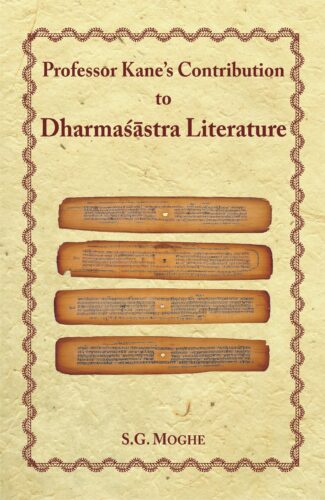
This study, in which Dr. Kane deals with the most obscure, hitherto-unnoticed sources, not just dispels widely-accepted fallacies or straightens out distortions but also (importantly) projects the fabulous legacy of Indias Dharmasastra literature.
If not peerless as an Indologist, Pandurang Vaman Kane (1880-1972) may have barely a few equals. A legitimate recipient of many, many enviable awards, including the Bharat Ratna the highest national honour in India, he was the distinguished Sanskritist, National Professor of Indology, Vice-Chancellor of Bombay University, Member of Parliament (nominated), and entitled Mahamahopadhyaya. And was a prolific author too his literary writings in English, Marathi and Sanskrit having been estimated to run across nearly 15,000 printed pages. Yet, M.M. Kane is to stay immortalized for his multivolume History of Dharmashastra: an encyclopaedic, at once authoritative work on ancient Indias religious and civil laws. This volume puts together nineteen of his essays to reinforce Professor Kanes unique insightfulness into Dharamashastra literature. Discreetly culled from the prodigious mass of his writings, these essays show how Dr. Kane conjures some of the most obscure, hitherto-unnoticed sources not just to dispel widely-accepted fallacies or straighten out distortions, but (importantly) to project the fabulous legacy of Indias Dharmashastra literature: in both its variegated richness and unflawed authenticity. Covering diverse themes from Dharmashastra literature: ranging from Pauranic legends to the Pauranic worldview of dharma and sacrifices, from the literary use of the Mahabharata citations to the questions of identity and chronology of Dharmashastra authors, Professor Kanes collection shows how King Bhoja evidenced the relevance of Dharmashastras to astrology; how far the Matsyapurana is indebted to Kautilyas Arthashastra; or how, in turn, Kautilyas classic compares with Kamashastra or Manu-Smriti; and how Vijnaneshvara is positioned vis-a-vis his predecessors.

The volume explores questions that reflect upon the literary, directly or tangentially, through the discourses and contexts of the linguistic, philosophical and cultural traditions of India. Questions of the literary are complemented and integrated with explorations of diverse cultural and reflective traditions.
“This book is the preliminary outcome of a research project at The English and Foreign Languages University, Hyderabad. Its thrust area is literary pedagogy, dealing with the textual canons, critical traditions and theoretical frameworks applied in literary studies. The present volume is an attempt to explore critical discourses on conceptualizations of literature and criticism in the discipline of English literary studies in India and canonical configurations of the predominantly Anglo-American canon of literary studies.
The contributing academics are from different universities who explored questions that reflect upon the literary, directly or tangentially, through the discourses and contexts of the literary, linguistic, reflective and cultural traditions of India.
This volume thus attempts to bring together diverse inquiries, locating and reflecting upon them. Finally, it features a conversation about the humanities in India with D. Venkat Rao, a distinguished academic scholar, whose work focuses on cultural memory and cultural difference.”
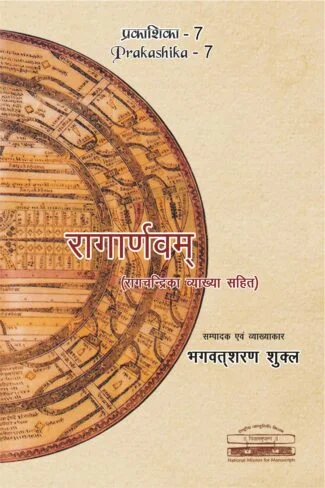
This composition of the sixteenth century, edited and commentated upon by Acharya Bhagawat Sharan Sukhla, introduces eighty-seven ragas, some are famous such as Bhairav, Bhairavi, Vasant, Tohri and Malkauns, and some are little known like Rodika, Saurashtri, Aothi, Yogi Bangalika and Kurai. It is part of the ongoing efforts of the National Mission for Manuscripts, giving exposure to the unpublished Sanskrit volumes.
The experiences and knowledge from our past are recorded in manuscripts which have been handed down to us over several thousand years. The Government of India, through the Department of Culture, took note of the importance of the vast tangible heritage and in order to preserve and conserve as well as to make access to this wealth easy, established the National Mission for Manuscripts. In order to disseminate the knowledge content of manuscripts, the Mission has taken up several programmes such as lectures, seminars and workshops. The Mission has published the proceedings of the above-said programmes under the following series: Samrakshika (on conservation), Kritibodha (critically edited texts), Tattvabodha (comprises lectures based on some manuscripts delivered by eminent scholars) and Samiksika (research-oriented papers as presented in the seminars). This year, the National Mission for Manuscripts has taken up a project for publishing rare and unpublished manuscripts in three formats (a) Facsimile, (b) Critical edition (illustrated and single copy manuscript), (c) Critical edition with annotation and translation. This new series has been named as Prakashika. Ragarnavam, critically edited by Acharya Bhagawat Sharan Shukla, comes under this series.
The happiness from the knowledge of music is well-known. From the very beginning of creation, music was the part and parcel of human civilization. Its relevance to our lives is known from the Vedic period. Besides nataka, Rishi Bharata is considered as the acarya of music too. To enrich this knowledge, many saint-composers devoted themselves to shastraic compositions. Ragarnavam is one of such compositions. Though no details are available on the compositor, this work is a sufficient proof of the composer’s mastery.
Ragarnavam, it is believed, was composed somewhere in the sixteenth century. It is a collection of eighty lyrics. Acharya Bhagawat Sharan Shukla has edited and written commentary on it, in the backdrop of the two available manuscripts of this composition. This composition introduces nearly eighty-seven ragas some are famous, some are little known. While this composition details famous ragas like Bhairav, Bhairavi, Vasant, Torhi, and Malkosh, it features ragas like Rodika, Saurashtri, Aothi, Yogi Bangalika, Kurai, as well.
This book will definitely be a boon to the music lovers. It can even entice researchers on music. This volume is part of the ongoing efforts of the National Mission for Manuscripts, giving exposure to the unpublished Sanskrit volumes.
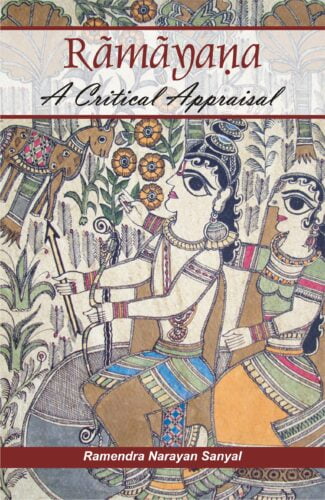
Written in a simple and lucid language, this book discusses the major events of the Ramayana, analysing and interpreting them from different angles. This volume should fascinate readers who want to gain a fresh perspective on the glorious Ramayana tradition.
Based on the Valmiki Ramayana, this book discusses the major events of the Ramayana including those in the Uttara-Kanda, analyzing and interpreting them with a fresh approach. Written in a simple and lucid style, the work deals with the birth of Rama, his destruction of rakshasas accompanied by his brother Lakshmana, of Dasaratha, Ramas exile, the many developments that led to the war between Rama and Ravana and the later events like Ramas coronation, his abandonment of Sita and the last journey of Lord Rama. It brings out the many qualities of Rama like virtuousness, courage, compassion, equanimity of mind, devotion to duty and truth, and selflessness that make Rama a glorious, divine figure and the story in the Ramayana an unparalleled epic of the world. It also discusses the controversial acts of Rama like his killing of Vali and humiliation of Sita after her rescue. It underlines the importance of the example of Rama and the teachings of the Ramayana in the contemporary world.
The volume will fascinate a range of readers general readers as well as scholars of Indian religion and culture who want to gain a fresh perspective on the glorious Ramayana tradition.
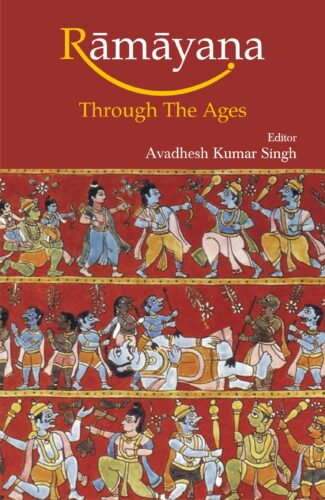
The tradition of Rama-Katha existed in many folk and oral forms before Adikavi Valmiki wrote the Sanskrit Ramayana. The subsequent centuries witnessed composition of Ramayana in Tamil, Malayalam, Bengali, Assamese, Hindi, Kashmiri, Gujarati, Marathi, etc. This volume shares their many similarities and dissimilarites.
The long and continuous tradition of Rama-Katha existed in many folk and oral forms before Adikavi Valmiki composed it in Sanskrit in written form as the Ramayana, a book of divine harmony . . . a bottomless and shoreless ocean of love, piety and clemency. The subsequent centuries witnessed composition of Ramayana in many Indian languages like Tamil, Malayalam, Bengali, Assamese, Hindi, Kashmiri, Gujarati and Marathi among others. These versions share many similarities and some dissimilarities among them, though their epicentral concerns remain the same.
The present volume comprising more than a dozen articles by distinguished scholars discuss Ramayana in different Indian languages. The volume, it is hoped, would lead to mutual illumination of Rama-Katha in different Indian languages and facilitate greater understanding of its timeless appeal and journey through ages.
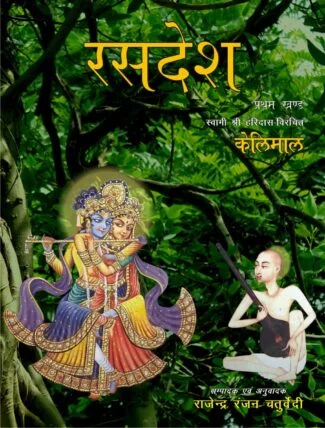
?????: ??????????????? ?? ?? ??????, ???? ??? ????? ?? ????? ?? ???? ??, ???? ??? ?? ?????? ????? ?? ???? ?? ???? ???? ?? ????? ???? ?? ?? ????? ???????? ?? ?????-???? ??, ??????? ????? ??????? ?????? ?? ???? ???? ???? ??, ??????? ?????? ??????? ??? ??? ?? – ?????? ??????? ?? ????? ?????? ???? ?????-??????? ??? ??? ???? ??????? ?? ????????? ?? ?? ?? ??? ??? ????? ???? ????? ?? ????? ??? ?? – ???????-????????
??????????????? ?? ?? ??????, ???? ??? ????? ?? ????? ?? ???? ??, ???? ??? ?? ?????? ????? ?? ???? ?? ???? ???? ?? ????? ??????? ???????? ?? ??? ??, ??? ???????? ?? ???? ?? ?????????? ???? ???? ???? ???????? ?? ???????, ???????, ?????????? ?? ????????????? ?? ????? ???? ?? ?? ????? ???????? ?? ?????-???? ??, ??????? ????? ??????? ?????? ?? ???? ???? ???? ??, ??????? ?????? ??????? ??? ??? ?? µ ?????? ??????? ???????? ?? ??????? ??? ????? ???? ??? ?????? ???????? ???? ??? ??? ?????? ???? ???? ??? ???? ???? ???? ??? ?? ????? ?????? ???? ?????-??????? ??? ??? ???? ??????? ?? ????????? ?? ?? ?? ??? ??? ????? ???? ??????? ?? ???????? ?? ?????? ?? ???? ??????? ?? ??? ??? ?????? ???? ??????? ??? ????? ?? ????????? ?? ???? ??? ??? µ ??? ?? ??? ??? ???, ??? ?? ?????? ??? ? ??? ?????
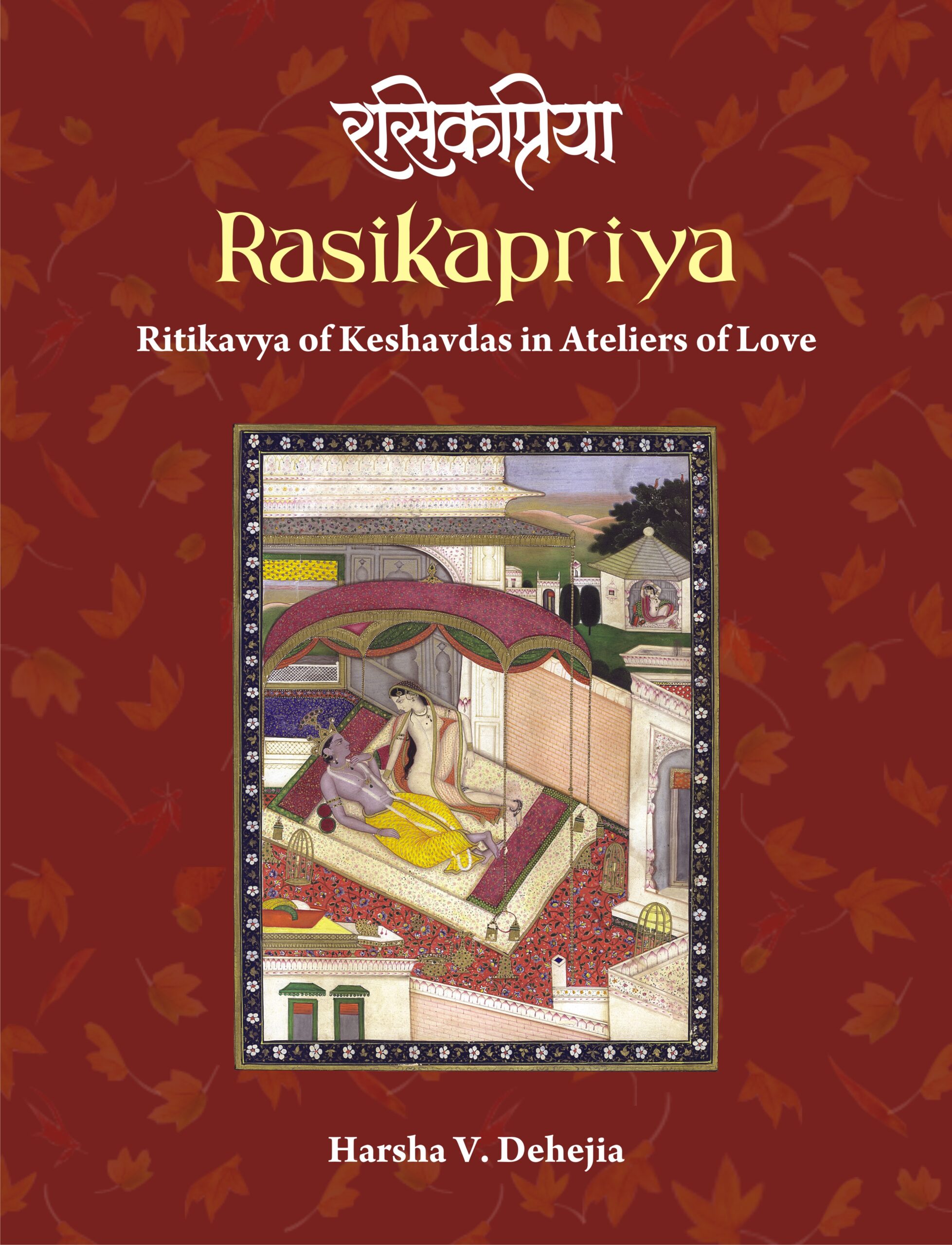
This book brings, for the first time, the translation of the entire text of Rasikapriya of Keshavdas in English with more than 400 paintings. In its pages are whispers of Krishna and Radha, and the hushed voices of the sakhis as they celebrate romantic moments of longing and belonging in the regal splendour of pranaya mandaps of havelis or verdant and idyllic groves.
Rasikapriya is a lakshan granth, a foundational text, of ritikavya or mannered poetry, and Keshavdas is the father of ritikal. It was the early seventeenth century, and in the court of Raja Indrajit of Orchha in Bundelkhand, Keshavdas, the court-poet, would recite short romantic verses and the gathered connoisseurs of poets, musicians and dancers would respond, and the atelier would resonate with the many textures and hues of shringara. This was the beginning of Rasikapriya, a text that is still central in the celebration of love. Keshavdas was a poets poet and he created a monumental text that remains the gold standard of ritikavya even today. And if that was not enough Rasikapriya inspired artists to create paintings illustrating its many dohas and savaiyas even in the lifetime of the poet.
Artists in the ateliers of Malwa, Mewar, Bikaner, Bundi and Kangra, among others, were touched by the evocative poetry of Rasikapriya and created paintings that were visual poetry. The names of Sahibdin of Mewar, Ruknuddin of Bikaner and Purkhu of Kangra stand out as artists that brought Rasikapriya to life through their mellifluous kalams.
Rasikapriya remains one of the most profusely illustrated texts in India and finds a place in collections of museums and individuals alike all over the world. This book brings together, for the first time, the translation of the entire text in English along with more than 400 paintings collected from a variety of sources. In its pages are whispers of Krishna and Radha and the hushed voices of the sakhis as they celebrate romantic moments of longing and belonging in the regal splendour of pranaya mandaps of havelis or verdant and idyllic groves. And as readers of this book recreate the music and the splendour of this text they cannot remain untouched by the sensuality and spirituality of shringara rasa and affirm that in celebrating the loves of Krishna one is never far from bhakti.
The book is a visual delight, a connoisseurs companion and a reference manual for scholars.